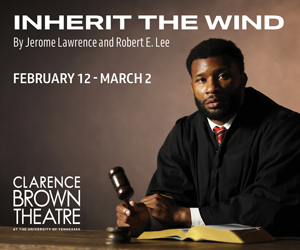Yet another of the downsides of the Covid pandemic precautions in 2020 was that we didn’t get to properly honor the 100th anniversary of one of the few occasions in which Tennessee has found itself on the affirmative edge of a positive, socially progressive issue. The Nineteenth Amendment to the U.S. Constitution granting American women the right to vote had passed the Congress in 1919 and was sent to the states to acquire the necessary ratification by 36 of the 48 states. Although southern states were strongly opposed to the amendment, on August 18, 1920, the Tennessee legislature voted to ratify the Nineteenth Amendment to the U.S. Constitution, becoming the 36th state to do so. It was close. The legislature’s vote had been tied 48-48, but the deciding affirmative vote came from the 26-year old State Representative, Harry T. Burn of Niota, TN, who changed his mind upon the advice of his mother, Febb Ensminger Burn.
That story is the inspiration and history behind the intriguing and well-performed The Burn Vote, a new musical getting its world premiere performances under the auspices of Knoxville’s River & Rail Theatre Company. The production had originally been set for August 2020 to coincide with the Nineteenth Amendment commemoration, but as with many things in life and the arts that year, Covid had other plans. Of course, four years late is better than never, so the long-delayed opening night finally came last Friday evening. An enthusiastic full-house crowd at the Old City Performing Arts Center received a cheerful dose of Tennessee history and storytelling from an excellent ensemble of actors, director Amelia Peterson, and playwright Chris Cragin-Day.

Cragin-Day’s script follows two angles: Harry T. Burn (Robert Parker Jenkins), a bright, young politician in the Tennessee legislature, and Febb Burn (Katy Wolfe), Harry’s mother back home running the family farm and business after the death of her husband. As is in most reality-based fiction, both of these benefit from imagined details and conversations that carry the plot along as the competing sentiments for women’s suffrage are explained and dramatized. Febb clearly desired the right to vote for women, but had agreed that she would not press the point with her son. On Harry’s side, his “eyes on the prize” secretary Lola (Amara Pappas), is representative of the anti-suffrage women who were content with working the gender status quo.
Figuring prominently in this story—nicely dramatically embellished—is the character of Knoxville’s own Lizzie Crozier French (Karen Nickell), who was a noted suffragist and social reformer. In truth, French had been a visible force in the suffrage movement for years, often speaking at Knoxville’s Market Square and serving as President of the Tennessee Equal Suffrage Association. When the time for ratification arrived, she spent her time in Nashville, lobbying legislators like Burn.
Jenkins, who appeared with River & Rail last December in It’s A Wonderful Life: A Live Radio Play, made the perfect Harry T. Burn with a combination of youthful, bright-eyed enthusiasm and a growing awareness of a larger, important reality.
Wolfe’s character of Febb Burn, sprinkled with gentleness and grace, is, nonetheless, a remarkably fleshed-out portrait of quiet strength and resolve. Her scenes with her departed husband James ( an excellent John Guerrasio) as a “manifestation of her grief” help to explain for the audience what motivates and supports her point of view as a woman, wife, and mother.
Cragin-Day and director Peterson have infused the play with energy and humor by the marvelous use of ensemble members taking a wide array of multiple roles of secondary characters, suffragists, “aw shucks” Legislature members, even President Woodrow Wilson, with portrayals that are deliberate gender opposites. These ensemble members are Denise Blank, Emma Tate, Celeste Pelletier, Ella Trisler, and Olivia Squires.
Strangely, despite the fact that The Burn Vote is a musical, and certainly deserves to be, that is its least impressive element. Certainly, the music and lyrics by Don and Lori Chaffer—some 20 numbers and reprises—have a “Tennessee” bounce and rhythm (“Harry T. Burn of Niota Tennessee”) in a gamut of up-tempo and ballad styles. Ultimately, though, one finds the musical premise overly simplistic in reflecting the gravity of a particular dramatic moment, or even a comic one. Unfortunately, too, some of the numbers feel obviously derivative of current Broadway trends—others merely pedestrian. What saves the day here is the fact that Wolfe, Nickell, and Jenkins are experienced singers and actors who know how to deliver an emotion in song. Kudos also go to the instrumental trio (Amy Porter, keyboard; Wade Jenkins, percussion; and Eric Hullander, bass ) that did a fine job of keeping the pacing tight and the musical energy level up with what they had to work with.
Although the story behind the ratification of the Nineteenth Amendment has been no secret, I couldn’t help but wonder how many of us have passed the Suffrage memorial sculpture in Market Square depicting Tennessee’s suffrage reformers Elizabeth Avery Meriwether, Lizzie Crozier French, and Anne Dallas Dudley, without giving it a second thought. At a time when basic rights of all citizens are being minimized and challenged and the anti-democracy voices are getting louder and more strident, we would do well to learn a lesson from the past about complacency. And, perhaps pause for moment and consider how much the Nineteenth Amendment has changed our lives for the better and how we can be conned into believing that voting is unimportant.
Music and Lyrics by Don and Lori Chaffer • Book by Chris Cragin-Day
Directed by Amelia Peterson
Thursdays – Saturdays at 7:30 PM; Sundays at 2:30 PM — Through May 12
Old City Performing Arts Center, 111 State Street
Tickets and Information






